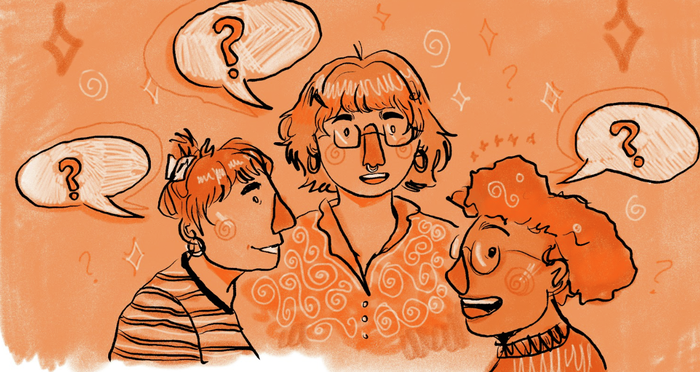It’s not just Week Five when we’re feeling blue
As week five draws to a close, Patrick Dolan questions why ‘Week Five blues’ is put on such a pedestal here

I’ll never forget my attempt to escape the ‘Week Five Blues’ by venturing to one of Cambridge’s infamous clubs, only to find myself ironically surrounded by Week Five Blues propaganda. Surely, this couldn’t be a club trying to profit from students’ mental health struggles? Such a club must never have seen students crying post-supos and desperately trying to escape the Cambridge bubble for the weekend. If I remember correctly, it was a ‘Post-Blues Bop’, playing songs like ‘Blue (Da Be Dee)’ to match this aesthetic. Week Five, supposedly associated with the strains of the academic side of the University, had followed me to the club. And was a Cambridge club really up to curing my blues?
On the infamous first day of Week Five – guilty as charged – I found myself hungover post-Revs, engaging in small talk before lectures, trying to prove that I could indeed hack it. The conversations that followed were collective sentiments of: “Can you believe it’s already Week Five?”. “What have I been doing for the past four weeks?” (I asked myself in a midterm crisis). “Are you feeling the Blues too?”. These depressing queries echoed against the walls of the Raised Faculty Building and haunted college courtyards. Even DoSes and lecturers buy into it. Most students will be familiar with the famous, “well done to you for turning up during Week Five, I’ll keep this nice and brief since I know you’ve all got things to be getting on with” that prefaces supervisions and emails during this week.
“Week Five has been thought of as a transient but permissible space where expressing one’s emotions is not just allowed but encouraged”
And, to a degree, they are right. No one can deny the challenges of Week Five; after all, there wouldn’t be specific terminology used to describe it if it wasn’t demanding. The shared sentiment transcends generations of Cambridge students: a looming dread of facing another four weeks, coupled with the guilt of feeling like you’ve either not done enough work or haven’t romanticised Cambridge enough up to this point.
We cannot escape the standard feeling of being down halfway through term by the very nature of the Cambridge experience. But I do question how much of this additional sadness is a placebo effect, influenced by both the anticipation that I should show some sadness out of respect for Week Five, and by the institution inadvertently promoting this sense of melancholy. This expectation almost trivialises genuine mental health issues by implying that “everyone gets sad sometimes.” Whilst it’s true that everyone experiences ups and downs in life, the impulsive concession that all students will feel down during this week erases serious mental health disorders that transcend the Week Five border and conceal deeper issues that desperately need to be addressed. It’s essential to recognise and embrace your genuine emotions, irrespective of external expectations, while also being cognisant of other people’s struggles.
Navigating the delicate balance between collective moaning about the downs of Cambridge life and dampening someone else’s mood even more is also crucial. An achievement of this equilibrium involves regular checking in with friends – which shouldn’t just be confined to the seven-day period. Although finding common ground with fellow students can indeed be comforting, it’s essential to recognise that genuinely struggling individuals could appreciate a change of topic once they have felt they have fully expressed their feelings.
“The impulsive concession that all students will feel down during this week erases serious mental health disorders that transcend the Week Five border”
Yet the question remains: what if I’m not experiencing the Week Five Blues as much as I should be? I can’t deny that this isn’t what I’m going through at the minute, but I vividly recall last year during Michaelmas when I managed my first Week Five pretty well. However, the relentless propaganda almost made me feel like I had to be sad. It felt like I had to wear a façade, otherwise people might question why I was doing okay. Or maybe that I wasn’t doing Cambridge the ‘right way’, that I wasn’t working hard enough, because if I was, I would feel the Blues too. And while all other Week Fives have unfortunately hit me hard, part of me felt a survivor’s guilt that time round, almost that I couldn’t be shown to be too okay during the fifth week otherwise it would be insensitive to others who were having a difficult time.
So if I’m just not sad during Week Five one term, it’s safe to say that it will hit at some other point, such as during Week Four or Week Six, which has often been a common occurrence for me. Unsurprisingly, like in many Cambridge quirks and instances, there seems to be an unwritten rule. If the blues hit during Week Four, it is the expectation that you bide your time and eventually join the collective struggle in Week Five. If the melancholy strikes in Week Six, then you’ve missed the window for sympathy and pity, and discussing feeling down at Cambridge becomes a taboo subject once more, a mere obstacle to the necessary productivity levels needed to just stay afloat during term time.
This is because Week Five has been thought of as a transient but permissible space where expressing one’s emotions is not just allowed but encouraged. It’s thankful that this week prompts discussions linked to mental health with the aim of fostering mutual support, even if it does get its bad reputation. A simple question like, “how are you? How was your day?“, during the challenging week can make all the difference.
Yet a different question still lingers: why can’t we extend this transparency about mental health to earlier and later weeks? Even though the institution acknowledges the natural dip in productivity during Week Five, other weeks don’t welcome the same compassionate understanding. Everybody knows that genuine sadness does not adhere to the constraints and boundaries of Week Five; it can surface at any moment in the Cambridge calendar, holidays included. And yet it’s almost as if the unspoken message is: “you’ve had your week off to feel low, so why are you still struggling come Thursday Week Six at 12:01 am?”
The rigid delineation of specific weeks, such as Week Five, as set periods for acknowledging mental health raises important questions about the authentic expression of emotions and underscores the significance of fostering year-round empathy and understanding. It is logical that falling behind and losing sight of the end during the middle of term can contribute to our low spirits, but we must be quick to ensure that we do not succumb to the pressure of fulfilling the expectation to be sad, nor let other people dictate our behaviour. Bottling up emotions, releasing them during a specific week, and then concealing them afterwards is, textbook speaking, a detrimental approach to mental health. And no amount of themed club nights will ever be able to address a serious case of the Week Five Blues.
 Comment / Plastic pubs: the problem with Cambridge alehouses 5 January 2026
Comment / Plastic pubs: the problem with Cambridge alehouses 5 January 2026 News / Cambridge academics stand out in King’s 2026 Honours List2 January 2026
News / Cambridge academics stand out in King’s 2026 Honours List2 January 2026 News / Cambridge businesses concerned infrastructure delays will hurt growth5 January 2026
News / Cambridge businesses concerned infrastructure delays will hurt growth5 January 2026 News / AstraZeneca sues for £32 million over faulty construction at Cambridge Campus31 December 2025
News / AstraZeneca sues for £32 million over faulty construction at Cambridge Campus31 December 2025 Interviews / You don’t need to peak at Cambridge, says Robin Harding31 December 2025
Interviews / You don’t need to peak at Cambridge, says Robin Harding31 December 2025










